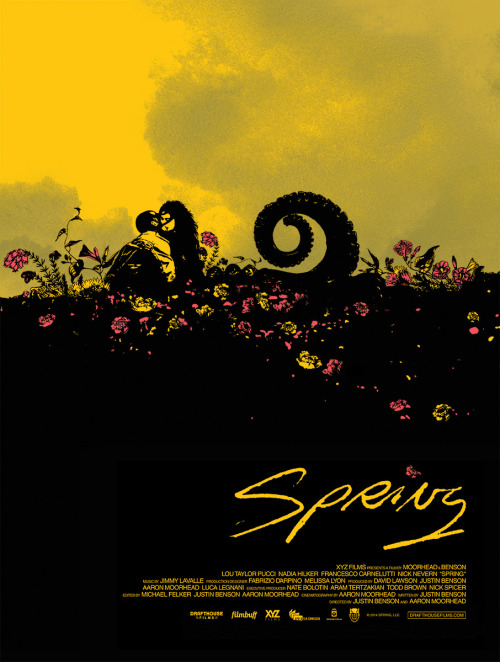The film follows a Californian man named Evan, who, after the death of his mother, jets off to Italy to clear his head. There he encounters Louise, an intriguing European woman fascinated by evolutionary genetics. Before too long, it becomes apparent there is something unnatural about her, and the question becomes one of: when will Evan find out, and how will he respond?
Film-makers Justin Benson and Aaron Moorhead garnered attention with their debut RESOLUTION (2012), a seriously weird film about a man helping his best friend go cold turkey in a cabin. Before too long it becomes apparent that they're being watched, possibly by something deeply sinister. RESOLUTION plays with perception in a manner akin to Michael Haneke's excellent HIDDEN and spirals into one of the most WTF endings I've ever seen.
With this, their second feature, they toy with perception in different ways. Is Louise playing hard to get? Is she actually dangerous, or controlled by her strange nature? It asks questions of love, of lust, of whether we can truly claim to know or feel something for someone we've just met. The obvious answer is 'of course not' but what about that that ineffable sense of truth that accompanies real love? When we know on an emotional level that can't be measured that this relationship, this person, is right...?
This desperation, this need to be with someone, to know, to prove they're the right person, flows throughout the latter half of the film. Evan understands it's crazy to tell someone after only five days he loves them, and Louise suggests his recent grief is clouding his judgement, but what if it took the death of a loved one to make him realise what he wants/needs from life, from a partner?
Grief underpins SPRING. Throughout, we're reminded that Evan is lost, emotionally, and that grief affects people differently - there is a poignant side story involving an elderly Italian farmer Evan finds work for, who himself is dealing with the death of a loved one (in a very quiet, dignified way). , Though it sinks into the background, death and its repercussions haunt the film in subtle ways; at one point, Louise and Evan head to several ancient graveyards, including one with mummified remains on clear display. It's eerie and fascinating in equal measure, like Louise herself.
It's not spoiling anything to tell you Evan discovers Louise's monstrous secret - after all, the point of the film is he finds out - but how he does, and how he reacts, are what makes things interesting. The film then hinges on the question: how willing are you to accept another person for what they are, if you truly love them?
This is a particularly interesting question to raise in the context of a love story. Plenty of romcoms and dramas answer it, of course, but rarely in such an intriguing or realistic way. Usually, there's the 'acceptance' of a person's 'faults' but no actual acknowledgement of what this acceptance really means. If the issue is so dark, so terrible that even thinking about it is difficult, what does 'acceptance' mean in this regard? It means acknowledging that the issue might fade from thought but never from memory, that its implications and/or consequences may well last the rest of your life. And that you are prepared to stand by that person, to support them in any way you can. It is a chance to show that love is/should/can be unconditional/non-judgemental.
The fx in SPRING are almost all pleasingly physical, with the CGI looking uncanny in the right way (an early shot of Louise's transformed form, with its uncomfortable bone structure and staccato movements, is unnervingly creepy). I thought after the first few times I'd seen all there was and, after hearing Lovecraft mentioned (and seeing the recurrent use of certain animal parts in publicity material) I was a little disappointed. But stick with it and you'll be rewarded with a suitably unique "monster" design.
Lovecraft isn't too bad a touchstone, in that Louise's condition has physical characteristics of some of his creations, there are plenty of shots of the ocean, and it all appears to take place in a small seaside town. There is also the terror of the unknown, of what is the actual cause of Louise's condition, though don't go in expecting huge inter-dimensional gods to pop up and everyone to go mad.
As much as I enjoyed all this ^ what I really liked, and took me by surprise, was the sense of humour in SPRING. Evan's best friend is a drunk/stoner but supportive in his own way and very quick to remind Evan that he loves him, which was a really sweet touch. Once Evan reaches Italy he tags along with a couple of boisterous English lads who are all about "booze and birds" - I've known plenty of lads like them and their characters were spot on, though thankfully lacking the (easy) hooligan aspects of typical wideboys. There are some genuine laughs in SPRING, which helps make it all feel grounded and real - it's a dark, sombre film but clearly set in our reality (despite all the weird stuff).
Why exactly SPRING works is easy to quantify: it treats all its themes (think about what the season of 'spring' typically means) with respect and blends styles so that no one genre has precedence over another. There are plenty of nice story touches (such as the apparent supernatural aspects of Louise's condition and her logic against them) and sweeping camera shots that speak of a confidence in the film-makers that they knew exactly what they wanted to make so they damn well made it.
(I was actually reminded quite a bit of the James Earl Jones b-movie BLOOD TIDE, so here's a song referencing that film:)



